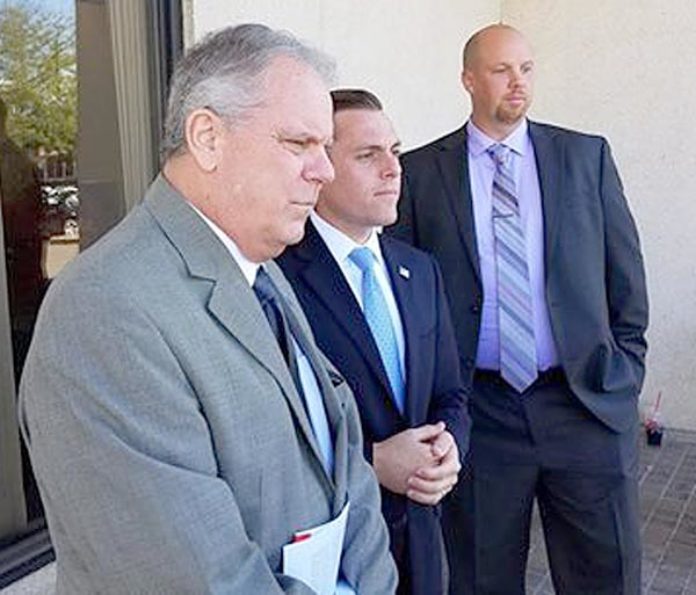The man at the center of a scandal that led to felony convictions of a former Kosciusko County sheriff and a former Grace Seminary professor was sentenced to seven years in Elkhart Community Corrections Friday.
Kevin Bronson, 60, pleaded guilty to one count of corrupt business influence in July. Under a plea agreement with prosecutors, special Judge Stephen Bowers sentenced him to seven years in the Indiana Department of Corrections, but will allow the time to be served in Elkhart Community Corrections.
Bronson’s lawyer, Pete Todd, presented a letter showing Bronson had been accepted into community corrections’ work release program.
Bronson’s sentence brings to close a case that began in February 2016.
Bronson was indicted with former Grace College professor Mark Soto and former Sheriff Aaron Rovenstine. Soto and Bronson were accused of a committing a series of intimidating acts to raise money for a movie or book about Bronson’s life.
Rovenstine was accused of agreeing to accept a bribe from Bronson, based on Bronson adding the sheriff to his will. The will includes many other people and organizations around the county, including Judge Torrey Bauer, current Sheriff Rocky Goshert, the Kosciusko County Republican Party, Serenity House, Penn High School tennis team and about 30 others.
Prosecutors contend that despite Bronson’s lack of funds, Rovenstine believed he would be paid off by the movie deal. In exchange for inclusion in the will, Rovenstine allegedly gave Bronson “special privileges” in jail.
All charges connecting Rovenstine to Bronson were dropped and Rovenstine pleaded guilty to one count of intimidation based on a heated phone call with Warsaw Police Department detective Paul Heaton, who was investigating Bronson.
Soto was convicted of two counts of corrupt business influence and one count of intimidation and sentenced to three years of home detention and three years of probation. He plans to appeal his conviction.
Despite Bronson agreeing to a deal before the trial of co-defendant Soto, Bronson took issue with the deal.
“You’ve got law enforcement taking hundreds of thousands, and a professor getting away with $300,000 and they get a day in jail, and I have already been in jail for three years,” Bronson said.
Bronson has been incarcerated since December 2014, when he was arrested on a cocaine charge. Bronson complained that he could be sent to prison if he violates the terms of his community corrections agreement.
“I would never have signed anything that had language in it that (involved the) Department of Corrections,” Bronson said. “You’ve got the Rovenstine family, which has been sheriff for 20 years, and probably a lot of law enforcement officers who are angry with me. I could just look at them wrong and they could violate me.”
Bowers assured Bronson that he would be treated fairly in Elkhart Community Corrections.
Bowers also reminded Bronson, “This was the agreement you signed, this is the agreement the court accepted.”
During Soto’s trial, Warsaw Police Chief Scott Whitaker testified he was disappointed with an April 2014 plea deal that kept Bronson out of prison on a cocaine charge.
After the sentencing, special Prosecutor Nelson Chipman said he was relieved to be done with the case.
“It’s been emotionally draining, and all the emotion has been drained out of me,” Chipman said.
Despite dropping charges that connected Bronson to Rovenstine, prosecutors still contend Rovenstine assisted Bronson in his criminal activities. Much of the evidence remains sealed by the court from the grand jury indictments. Chipman said after a discussion with Bowers, the judge doesn’t think the grand jury report should be made public.
Deputy prosecutor Matthew Sarber said he hasn’t seen many humans like Kevin Bronson.
“That’s the thing that gives us the most pause in this case. You had a sheriff and you had a minister who took him in and put him in the community where he could be, who Kevin Bronson is, a criminal and they were OK with that,” Sarber said.
Chipman addressed the two plea deals in the case and people who think Rovenstine and Bronson got off too easy.
Chipman said Rovenstine offered the plea deal to them as Rovenstine’s trial was about to begin.
“If you can lock in a conviction, you might as well do it,” Chipman said.
Rovenstine’s son, Austin Rovenstine, said in a phone interview that it was his understanding deputy prosecutor Tami Napier offered the deal during jury selection.
Sarber added that plea deals also mean the defendant cannot appeal.
Chipman addressed the people who have criticized the grand jury indictment from the beginning, saying all three people who were indicted now have felony convictions.
“There’s no reason to dig at them. Criticism comes with the territory when you’re a prosecutor,” Chipman said.
Heaton said he wanted to thank the Marshall County Prosecutor’s Office for all that they’ve done to hold people accountable for their actions.
“It’s the beginning of closure. There’s some more healing that needs to be done,” Heaton said.





